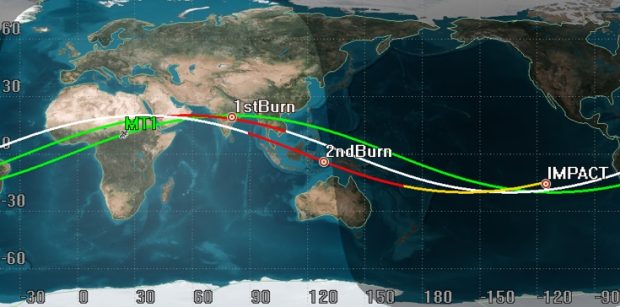
ISRO successfully carries out “extremely challenging” controlled re-entry experiment of aged satellite
PTI, Mar 8, 2023, 8:10 AM IST

Image credit: Twitter / @isro
Bengaluru: The Indian Space Research Organisation said it successfully carried out an ”extremely challenging” controlled re-entry experiment of the decommissioned orbiting Megha-Tropiques-1 (MT-1) satellite on Tuesday.
”The satellite re-entered the Earth’s atmosphere and would have disintegrated over the Pacific Ocean”, the Bengaluru-headquartered national space agency said on Twitter.
The final impact region estimated is in the deep Pacific Ocean within the expected latitude and longitude boundaries, an ISRO statement said.
The low Earth satellite was launched on October 12, 2011, as a joint satellite venture of ISRO and the French space agency, CNES for tropical weather and climate studies.
Since August 2022, the satellite’s perigee was progressively lowered through a series of 20 manoeuvres spending about 120 kg of fuel.
Multiple manoeuvres including the final de-boost strategy were designed after taking into consideration several constraints, including visibility of the re-entry trace over ground stations, ground impact within the targeted zone, and allowable operating conditions of subsystems, especially the maximum deliverable thrust and the maximum firing duration constraint on thrusters.
All manoeuvre plans were screened to ensure that there would be no post manoeuvre close approaches with other space objects, especially with the crewed space stations like International Space Stations and the Chinese Space Station, ISRO said.
The final two de-boost burns were executed at 11:02 UTC and 12:51 UTC respectively on March 7 by firing four 11 Newton thrusters on-board the satellite for about 20 minutes each, it said.
The final perigee was estimated to be less than 80 km indicating that the satellite would enter the denser layers of the Earth’s atmosphere and subsequently undergo structural disintegration. The re-entry aero-thermal flux analysis confirmed that there would be no surviving large debris fragments.
The entire sequence of events was carried out from the Mission Operations Complex in ISTRAC (ISRO Telemetry, Tracking and Command Network), Bengaluru.
An uninhabited area in the Pacific Ocean between 5°S to 14°S latitude and 119°W to 100°W longitude was identified as the targeted re-entry zone for MT1, weighing about 1000 kg, ISRO said earlier this week.
About 125 kg on-board fuel remained unutilised at its end-of-mission that could pose risks for accidental break-up, an ISRO statement had noted.
This left-over fuel was estimated to be sufficient to achieve a fully controlled atmospheric re-entry to impact the uninhabited location in the Pacific Ocean, ISRO had said.
Controlled re-entries involve deorbiting to very low altitudes to ensure impact occurs within a targeted safe zone.
Usually, large satellites/rocket bodies, which are likely to survive aero-thermal fragmentation upon re-entry, are made to undergo controlled re-entry to limit ground casualty risk.
However, all such satellites are specifically designed to undergo controlled re-entry at end-of-life (EOL).
”MT-1 was not designed for EOL operations through controlled re-entry which made the entire exercise extremely challenging”, ISRO said.
Furthermore, the on-board constraints of the aged satellite, where several systems had lost redundancy and showed degraded performance, and maintaining subsystems under harsher environmental conditions at much lower than originally designed orbital altitude added to the operational complexities, it said.
The controlled re-entry experiment for the decommissioned Megha-Tropiques-1 (MT-1) was carried out successfully on March 7, 2023.
The satellite has re-entered the Earth’s atmosphere and would have disintegrated over the Pacific Ocean. pic.twitter.com/UIAcMjXfAH
— ISRO (@isro) March 7, 2023
Innovative workarounds were implemented by the operations team based on the study, deliberations, and exchanges among the mission, operations, flight dynamics, aerodynamics, propulsion, controls, navigation, thermal, and other sub-system design teams across the ISRO centres, who worked in synergy to surmount these challenges, it said.
Although the mission life of the satellite originally was three years, it continued to provide valuable data services for more than a decade supporting regional and global climate models till 2021, ISRO said.
UN/IADC (Inter-Agency Space Debris Coordination Committee) space debris mitigation guidelines recommend deorbiting a LEO (Low Earth Orbit) object at its EOL, preferably through controlled re-entry to a safe impact zone, or by bringing it to an orbit where the orbital lifetime is less than 25 years, according to ISRO.
It is also recommended to carry out ”passivation’ of on-board energy sources to minimise the risk of any post-mission accidental break-up, it said.
The orbital lifetime of MT-1 would have been more than 100 years in its 20 deg inclined operational orbit of 867 km altitude, according to ISRO. ”As a responsible space agency committed to safe and sustainable operations in outer space, ISRO proactively takes efforts for better compliance with the UN/IADC space debris mitigation guidelines on post-mission disposal of LEO objects”, the ISRO statement said.
Udayavani is now on Telegram. Click here to join our channel and stay updated with the latest news.
Top News
Related Articles More

“No need to learn morality from …”: Udupi Congress Campaign Chief hits back

Bengaluru: Woman cheated on pretext of marriage; complaint filed

Actor, director and producer Dwarakish no more

Manipal Hospitals hosts special evening for young cancer survivors at RCB match, Bringing joy and hope to lives

Complaint filed with EC over alleged ruckus at BJP MP Tejasvi Surya’s event
MUST WATCH
Latest Additions

HC asks Centre to consider stakeholders’ objections before finalising fresh circular on banning ferocious dog breeds

“No need to learn morality from …”: Udupi Congress Campaign Chief hits back

TMC protects infiltrators, opposes CAA: PM Modi

Bengaluru: Woman cheated on pretext of marriage; complaint filed

Surgical options for Parkinson’s disease
























